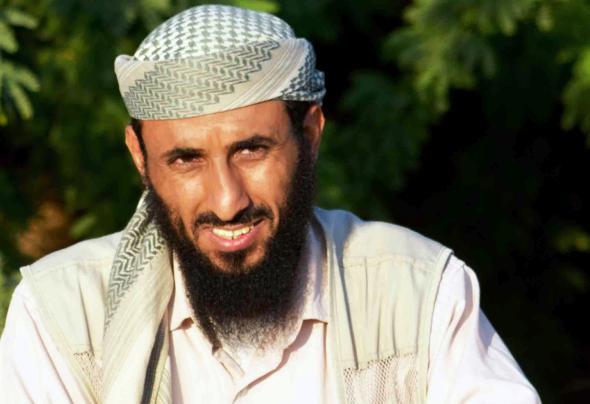Al-Qaida’s general manager (more often referred to as the terror network’s “No. 2”) is a position with a pretty high turnover rate. There was Mustafa Abu al-Yazid, killed in a U.S. drone strike in 2010, Atiyah Abd al-Rahman, killed in a U.S. drone strike in 2011, and Abu Yahya al-Libi, killed in a U.S. drone strike in 2012.
So it’s particularly shocking to see the current occupant of that position, Nasir al-Wuhayshi—also the emir of an offshoot group, al-Qaida in the Arabian Peninsula, brazenly holding an open-air meeting in Yemen with more than 100 fighters in attendance.
This could be a sign that AQAP is feeling more secure. (A jailbreak in the capital, Sana’a, was a recent success for the group.) Or it could simply be reckless: While the U.S. drone war may be on hold in Pakistan, strikes continue with brutal regularity in Yemen.
Wuhayshi is believed to have been tapped for the GM position by global al-Qaida leader Ayman al-Zawahiri following al-Libi’s death, in a sign that power is shifting from al-Qaida’s traditional base in Pakistan to AQAP, which has clearly been the most active and dangerous branch of the group for some time.
The Yemen-born Wuhayshi served as Osama Bin Laden’s personal aide in Afghanistan from the early 1990s until the 9/11 attacks, and fought at the Battle of Tora Bora. After al-Qaida fled the country, Wuhayshi wound up in Iran for a time, was deported to Yemen and arrested, then escaped in a now-famous jailbreak in 2006.
After his escape, he helped found AQAP, responsible for numerous attacks within Yemen and known internationally for the 2003 Riyadh bombing, the 2008 attack on the U.S. embassy in Sanaa, the attempted 2009 Detroit plane attack, and the online propaganda of Anwar al-Awlaki. A member of al-Qaida’s younger generation, Wuhayshi is reportedly known for his Internet savvy and played a role in the founding of Awlaki’s Inspire magazine.
In a 2010 New York Times article, a Yemeni journalist who has met him describes him as “laconic but quick-witted, with flashes of sarcastic humor and a remarkable ability to adduce Koranic verses to back up anything he said.” Wuhayshi seemed to be emulating his mentor Bin Laden in his leadership style: “more cerebral guide than day-to-day commander.”
In his current position, Wuhayshi’s duties encompass not only his own regional affiliate but all of al-Qaida’s groups. According to reporting by the Daily Beast, a “conference call”—which was likely not an actual phone call—he organized with Zawahiri last year involved “leaders from Nigeria’s Boko Haram, the Pakistani Taliban, al Qaeda in Iraq, al Qaeda in the Islamic Maghreb, and more obscure al Qaeda affiliates such as the Uzbekistan branch.”
That meeting was intercepted by U.S. intelligence, prompting the closing of embassies throughout the region. Given the ease with which the plans discussed at that meeting seem to have been disrupted, it’s possible that a face-to-face meeting—despite the risk of a drone strike—was seen as less operationally risky.
Whatever the reason, it seems like an awfully big gamble from an al-Qaida commander who’s been fairly canny up until now.
